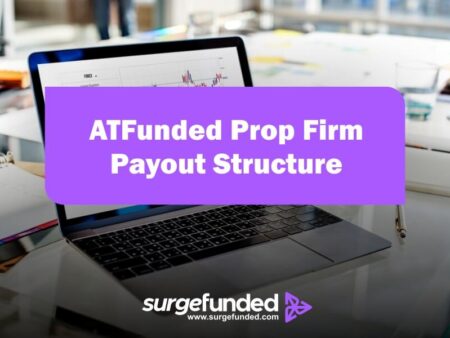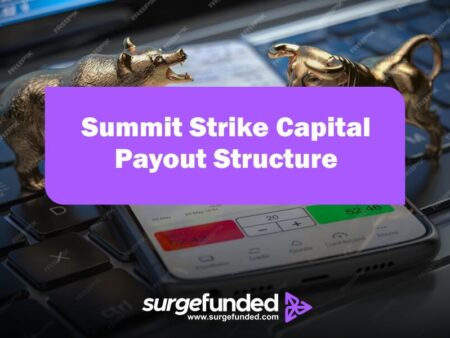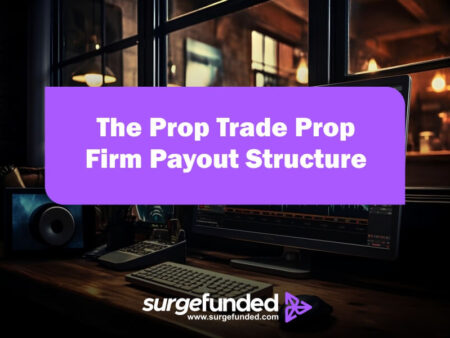The funded trader payout structure, in particular the consistent or regular payout system, is one of the main draws for traders. Many traders have been driven to prop trading firms by the opportunity to trade with firm capital and the possibility of making substantial profits in the world of prop trading. The payout structure of these prop firms is one of the most important things that potential traders should comprehend. One prop firm that gives traders access to significant funds is The Funded Trader, but how precisely are funded traders compensated? This article offers a thorough analysis of The Funded Trader’s payout structure, outlining its components, workings, and trader consequences.
Overview of The Funded Trader
Funded Trader is a prop firm that gives traders access to funds so they can trade stocks, futures, and forex, among other financial instruments. It is anticipated that traders will give the prop firm a portion of their profits in exchange. The Funded Trader strives to provide a transparent and equitable payout procedure together with a helpful trading atmosphere and cutting-edge trading tools and information. For traders to properly manage their money and optimize their trading potential, they must comprehend the payment structure.
An Overview of the Funded Trader Payout Structure
The Funded Trader payout system is intended to reward excellent performance and be transparent. This is an explanation of how the payout system normally operates:
1. The Model of Profit Sharing:
The Funded Trader’s profit-sharing model is the foundation of its payment system. How profits are split between the trader and the firm is decided by this model. Important components consist of:
- Profit Split: At The Funded Trader, traders typically get a portion of the earnings they make. Typically, the trader receives 70% to 80% of the profit share, with the firm receiving the remaining portion. This division shows the company’s dedication to compensating traders for their efforts while making sure the company gains from profitable trading as well.
- Performance-Based Adjustments: The Funded Trader may make changes to the profit-sharing ratio based on account size or performance data in order to further reward extraordinary performance. A more advantageous profit split might be awarded to traders who reach predetermined benchmarks and perform well on a regular basis.
2. Frequency of Payment:
Payout frequency is a crucial component of financial planning. Usually, the Funded Trader provides:
- Monthly Payouts: Every month, payouts are typically handled. A steady revenue stream is given to traders on this regular basis, which helps with managing personal spending, paying for trading-related fees, and reinvesting profits.
- Custom Payout: There may be choices available to customize the payout frequency, contingent upon the trader’s consent and the firm’s policies. Because of this flexibility, traders can adjust the payout schedule to suit their unique financial requirements and preferences.
3. Minimum Limits on Payouts:
Minimum payout criteria are employed to maintain the effectiveness and economy of the payout procedure. Important things to note are:
- Threshold Amount: Before a trader may request a payout, the Funded Trader may establish a minimum profit threshold that they must meet. This cutoff point keeps administrative expenses in check and guarantees a smooth payout procedure.
- Accumulation Period: It’s important for traders to know how long it takes to make enough money to cover the minimum payout requirement. The rate at which traders can demand payouts may vary depending on how quickly they accumulate profits.
4. Charges and Withholdings:
It is essential to comprehend the costs and deductions related to payouts in order to assess net profitability:
- Administrative Fees: Processing payouts may result in administrative expenses. To ensure transparency, these costs are usually specified in the trader’s agreement.
- Trading Costs: Traders need to factor in trading costs including commissions, spreads, and other fees in addition to administrative fees. These expenses may have an impact on overall profitability and, in turn, the amount paid out net. To make sure that traders are fully informed, the Funded Trader offers comprehensive information on these expenses.
The Funded Trader Payout Structure Benefits
The Funded Trader payout system is appealing to traders who want to maximize their trading experience because it provides multiple benefits:
1. Consistent Revenue:
Consistent payouts offer a reliable source of income, which is advantageous for budgeting and financial planning. Consistent payouts are a reliable source of income for traders to engage in trading, handle personal bills, and meet other demands.
2. Incentives for Performance:
Strong incentives for traders to perform well are provided by the profit-sharing model and performance-based adjustments. Traders are motivated to maintain discipline, stick to their trading strategy, and aim for larger returns when they are aware that their profits are directly correlated with their success.
3. Prospects for Reinvestment:
Traders can reinvest their profits more frequently when they receive rewards frequently. Their trading capital may expand compounding as a result, thereby increasing overall profitability.
4. Flexibility with Money:
More financial flexibility is provided to traders by customizable payout options. Traders have more control over their earnings because they may select a payout frequency that best fits their unique financial requirements and preferences.
Factors to Take Into Account When Assessing The Funded Trader Payout Structure
Even though The Funded Trader payout system has several advantages, traders should take into account a few things:
1. Being Aware of The Terms and Conditions:
Examine the compensation structure of The Funded Trader’s terms and conditions carefully. This entails being aware of the minimum payout levels, profit-sharing ratio, and any related expenses. A thorough understanding of these concepts ensures congruence with individual financial goals and helps prevent unpleasant shocks.
2. Assessing Total Trading Expenses:
Evaluate the entire trading cost structure at The Funded Trader. Take into account trading expenses including commissions, spreads, and other fees in addition to payout-related fees. It is essential to comprehend these expenses in order to assess net profitability.
3. Evaluating Resources and Assistance:
Analyze The Funded Trader’s degree of assistance and resources. Trading success can be greatly impacted by having access to risk management assistance, educational materials, and trading instruments. A strong support network makes trading more enjoyable overall.
4. Reviewing Reputation and Track Record:
To determine the legitimacy and dependability of the company, look for reviews, endorsements, and comments from present or previous traders. This data offers insightful information about the company’s performance history and approach to dealing with traders.
Summarily,
Funded Trader enables traders have a special chance to obtain substantial capital while lowering their risk exposure. With monthly rewards, a systematic review procedure, and a competitive profit-sharing plan, the program is a good fit for both new and seasoned traders.
To optimize profits and manage the intricacies of sponsored trading, traders must comprehend the payment structure and related regulations. Through the utilization of The Funded Trader Program’s resources, traders can start a profitable trading path that corresponds with their financial objectives and desires. The Funded Trader Program gives traders the tools they need to succeed in the cutthroat world of financial markets by committing to openness and trader success.
Frequently Asked Questions
1. Which payout options are available?
- Several ways, including bank transfers and cryptocurrencies like Bitcoin (BTC), Ethereum (ETH), and USDC, are available for payouts. The approach that best meets their demands might be selected by traders.
2. What happens if I choose to switch around accounts?
- Within The Funded Trader Program, traders are permitted to open and maintain numerous funded accounts. Because of this versatility, traders may efficiently manage risk and diversify their trading tactics.
3. How is the scaling strategy implemented?
- The scaling strategy pays traders according to how well they execute. Traders may become eligible for an increase in the size of their account after meeting certain profit criteria. This scaling strategy encourages traders to concentrate on long-term, steady profitability.
4. How does the assessment procedure work?
- There are two stages to the review process. Traders have to meet a profit target in the first phase and stick to the drawdown limitations within a given time frame. After completing the first phase successfully, traders can advance to the second, which often has a lower profit target but might have more stringent drawdown restrictions.
5. Does the evaluation have any costs attached?
- Yes, there is a one-time cost to take part in the assessment procedure. Depending on the selected account size, this cost changes. When the trader successfully completes the evaluation and starts trading with a funded account, this charge is frequently reimbursed.


















